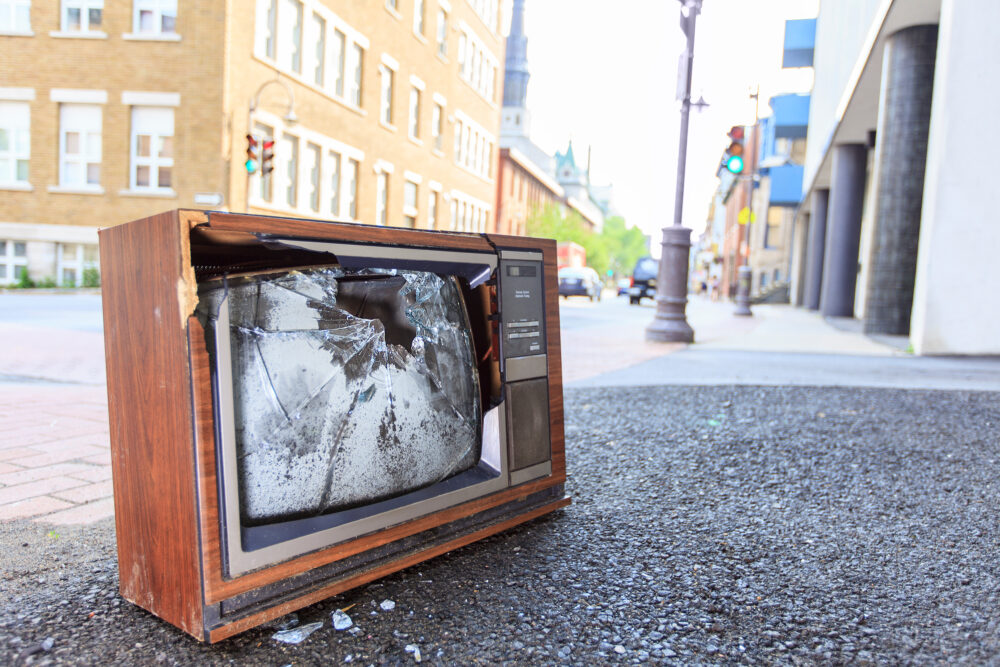E-Waste Disposal Guide: How to Handle Electronics Responsibly
Your old smartphone sits in a drawer, joined by that broken laptop and the tablet your kids outgrew. Sound familiar? You’re not alone—the average American household accumulates over 40 pounds of electronic waste annually, yet only 20% of e-waste gets properly recycled. The rest ends up in landfills, where toxic materials can leach into soil and groundwater for decades.
Electronic waste isn’t just an environmental concern—it’s a growing challenge that affects every household. When electronics break down or become obsolete, many people feel uncertain about proper disposal methods. At Sunny Trash Hauling, we see this confusion daily as customers ask about responsible ways to handle their old devices. The good news? Understanding e-waste and learning responsible disposal practices can make a significant difference for both your community and the planet.

What Exactly Is E-Waste?
Electronic waste, commonly called e-waste, encompasses any discarded electrical or electronic device. This includes obvious items like computers, phones, and televisions, but also extends to smaller electronics like digital cameras, gaming consoles, and even electronic toys. The Environmental Protection Agency estimates that Americans generate over 6 million tons of e-waste each year, making it one of the fastest-growing waste streams globally.
The challenge with electronic devices lies in their complex composition. Most contain valuable materials like gold, silver, and rare earth elements, alongside potentially harmful substances including lead, mercury, and cadmium. When these devices end up in traditional landfills, toxic materials can contaminate surrounding environments, while valuable resources go to waste.
Why Proper E-Waste Disposal Matters
The environmental impact of improper electronic disposal extends far beyond your local landfill. Heavy metals from electronics can contaminate water supplies, affecting both wildlife and human health. Additionally, many electronic components take hundreds of years to decompose naturally, creating long-term environmental challenges.
From a resource perspective, electronic devices contain precious metals that mining companies extract through environmentally intensive processes. Proper e-waste recycling recovers these materials, reducing the need for new mining operations and conserving natural resources. Studies show that recycling one million laptops saves energy equivalent to powering over 3,500 homes for a year.
Safe and Responsible Disposal Methods: Certified E-Waste Recycling Centers
Professional e-waste recycling facilities specialize in safely dismantling electronic devices and recovering valuable materials. These certified centers follow strict protocols for data destruction and environmental protection. When choosing a recycling center, look for certifications like R2 (Responsible Recycling) or e-Stewards, which guarantee adherence to the highest industry standards.
Retailer Programs
Many major retailers offer convenient e-waste collection services. Best Buy, Staples, and Office Depot accept various electronics at their stores, making responsible disposal accessible during regular shopping trips. Some retailers even offer special collection events for larger items or bulk disposal needs.
Preparing Your Electronics for Disposal
Before disposing of any electronic device, data security should be your primary concern. Simply deleting files doesn’t permanently remove them—you’ll need to perform a factory reset and use data wiping software for sensitive devices. Remove or destroy hard drives from computers when possible, and don’t forget to remove memory cards, SIM cards, and any external storage devices.
Physical preparation matters too. Remove batteries from devices when possible, as these often require separate recycling processes. Clean devices of any personal stickers or attachments, and gather original accessories like chargers or cables, which can often be recycled alongside the main device.
When Professional Help Makes Sense
While many e-waste disposal options exist for individual consumers, businesses and households with large quantities of electronics benefit from professional waste management services. Companies like Sunny Trash Hauling understand the complexities of electronic waste and can coordinate proper disposal while ensuring compliance with local regulations and environmental standards.
Professional services become particularly valuable when dealing with business equipment, large appliances, or situations requiring certified data destruction. These services handle the logistics of responsible disposal while providing documentation for compliance purposes.
Making E-Waste Disposal Part of Your Routine
Responsible electronic disposal works best when integrated into your regular household routines. Consider designating a specific area for electronics awaiting disposal, and research local collection events or permanent drop-off locations in advance. Many communities host periodic e-waste collection drives, making responsible disposal both convenient and cost-effective.
The key to successful e-waste management lies in planning ahead rather than waiting until devices pile up. When purchasing new electronics, consider the end-of-life disposal process and factor this into your decision-making alongside price and features.Understanding e-waste disposal doesn’t have to be overwhelming. By taking small, consistent steps toward responsible electronic disposal, you’re contributing to environmental protection while ensuring your personal data stays secure.
Whether you choose manufacturer programs, local recycling centers, or professional waste management services, the important thing is taking action. Sunny Trash Hauling specializes in comprehensive waste management solutions, including proper e-waste disposal. Contact us today to learn how we can help you dispose of electronics safely while protecting both your data and the environment.
